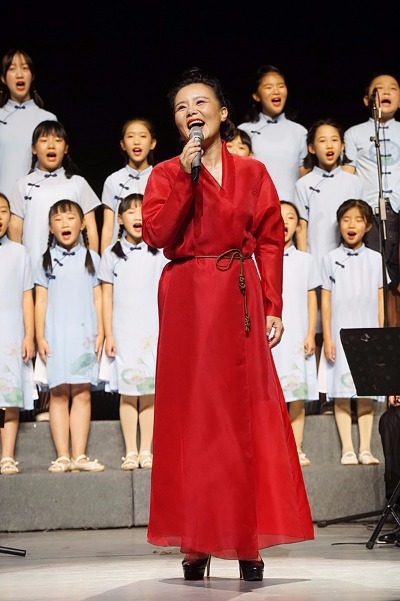Chinese singer Gong Linna embarks on nationwide tour
By Chen Nan | chinadaily.com.cn | Updated: 2019-10-22 11:17

Chinese singer Gong Linna has launched the second round of her nationwide tour, singing songs written by her husband, German composer Robert Zollitsch, about the 24 Solar Terms. The first stop was Guiyang, capital of Southwest China's Guizhou province, where Gong was born and raised. She will perform in several Chinese cities, including Qingdao of Shandong province, Haikou of Hainan province and Fuzhou of Fujian province.
The 24 Solar Terms, a traditional Chinese calendar that summarizes different seasonal phenomena, have inspired many artists, from choreographers and painters to composers. Each of the 24 points on the traditional Chinese lunar calendar matches an astronomical event or signifies a natural phenomenon. In November 2016, the 24 Solar Terms were added to the UNESCO's Lists of the Intangible Cultural Heritage of Humanity.
Since 2017, with the help of their friend, Jing Yuanhua, who teaches Chinese language at Renmin University of China, the couple have selected 24 traditional Chinese poems and turned them into 24 songs.
Each of the 24 songs combine traditional Chinese instruments, such as the bamboo flute, xiao (vertical Chinese flute) and sheng (a traditional Chinese wind instrument) with contemporary musical elements.
Gong began learning Chinese folk singing at a very young age and enrolled at the Chinese Conservatory of Music in Beijing at 16.
Before settling down in Beijing in 2009, Zollitsch researched traditional Chinese music in the Inner Mongolia and Tibet autonomous regions, while collaborating with a number of Chinese musicians. The couple met in 2002 and married in 2004.
In 2009, Gong received rave reviews after she released the song Tan Te (Disturbed) online. Composed by Zollitsch, the song uses sounds rather than words to convey different emotions and moods.
The couple has been dedicated to reviving traditional Chinese music with songs based on traditional Chinese culture, such as Chinese poems of Song Dynasty (960-1127) and Tang Dynasty (618-907).
























